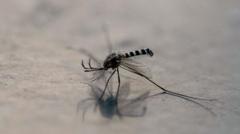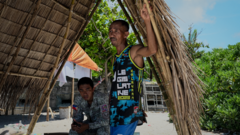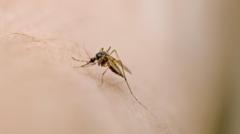In response to a significant increase in dengue cases, the village chief of Barangay Addition Hills in Manila has launched a cash reward program for capturing mosquitoes. While the initiative has attracted criticism online, local health officials underscore the need for innovative solutions to curb the outbreak.
Philippine Community Implements Mosquito Bounty Amid Dengue Surge

Philippine Community Implements Mosquito Bounty Amid Dengue Surge
As dengue fever cases rise in the Philippines, the Barangay Addition Hills community introduces a mosquito bounty to combat the health crisis.
In Barangay Addition Hills, a densely-populated area in central Manila, local authorities have initiated an unconventional response to a surge in dengue fever cases: offering a cash bounty for mosquitoes. Carlito Cernal, the barangay chief, declared that residents will receive one peso (approximately two US cents) for every five mosquitoes or larvae they bring in, a program set to last for at least a month.
This initiative was sparked by a recent spike in dengue infections in the community, highlighted by the unfortunate deaths of two local students attributed to the illness. Despite facing criticism on social media—where comments likened the situation to "mosquito farming" or questioned the criteria for accepting mosquito bounties—Cernal has stood by the program, asserting its importance for community health.
Statistics from the local health department indicate that Barangay Addition Hills reported 44 dengue cases during the latest outbreak, with health officials emphasizing that conditions in densely populated urban areas can facilitate the spread of mosquito-borne diseases. The bounty aims to complement established anti-dengue measures, such as ongoing cleanup efforts to eliminate potential breeding sites.
The Department of Health (DOH) of the Philippines acknowledged the efforts of local government initiatives aimed at tackling dengue but refrained from commenting on the efficacy of monetary rewards for insects. Instead, the DOH has recommended more evidence-based practices for controlling outbreaks, including maintaining clean surroundings and using mosquito repellents.
Dengue fever, an endemic disease in tropical climates, can lead to severe symptoms such as internal bleeding and has seen a significant increase in cases nationally. Recent reports show that as of February, there were over 28,000 cases, marking a staggering 40% increase from the prior year. Besides dengue, health experts have also observed rising cases of other diseases linked to recent seasonal rains, including influenza-like illnesses and leptospirosis.
As the community grapples with this public health crisis, Cernal emphasizes the need for swift action, advocating for innovative strategies to mitigate the impact of dengue and protect public health within Barangay Addition Hills.





















